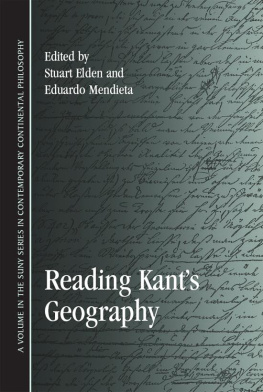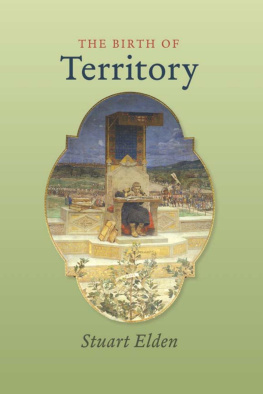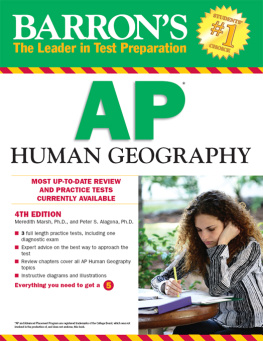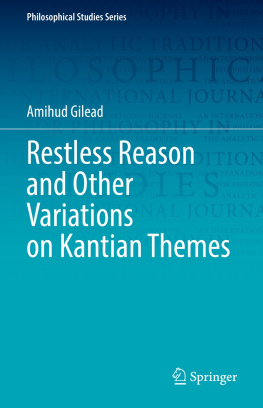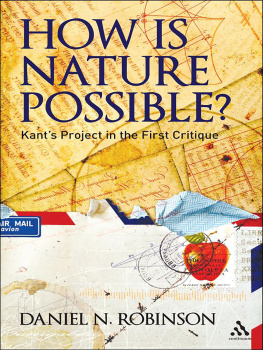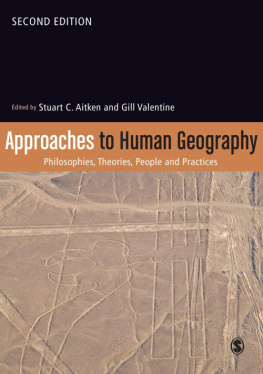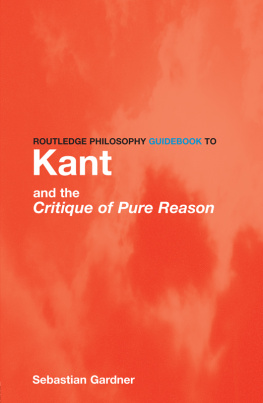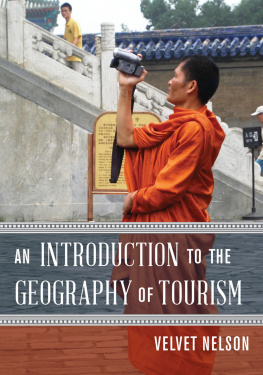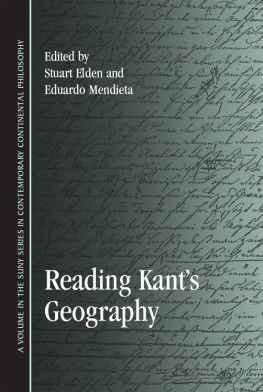Stuart Elden - Reading Kants Geography
Here you can read online Stuart Elden - Reading Kants Geography full text of the book (entire story) in english for free. Download pdf and epub, get meaning, cover and reviews about this ebook. year: 2011, publisher: Suny Press, genre: Religion. Description of the work, (preface) as well as reviews are available. Best literature library LitArk.com created for fans of good reading and offers a wide selection of genres:
Romance novel
Science fiction
Adventure
Detective
Science
History
Home and family
Prose
Art
Politics
Computer
Non-fiction
Religion
Business
Children
Humor
Choose a favorite category and find really read worthwhile books. Enjoy immersion in the world of imagination, feel the emotions of the characters or learn something new for yourself, make an fascinating discovery.
- Book:Reading Kants Geography
- Author:
- Publisher:Suny Press
- Genre:
- Year:2011
- Rating:5 / 5
- Favourites:Add to favourites
- Your mark:
- 100
- 1
- 2
- 3
- 4
- 5
Reading Kants Geography: summary, description and annotation
We offer to read an annotation, description, summary or preface (depends on what the author of the book "Reading Kants Geography" wrote himself). If you haven't found the necessary information about the book — write in the comments, we will try to find it.
Reading Kants Geography — read online for free the complete book (whole text) full work
Below is the text of the book, divided by pages. System saving the place of the last page read, allows you to conveniently read the book "Reading Kants Geography" online for free, without having to search again every time where you left off. Put a bookmark, and you can go to the page where you finished reading at any time.
Font size:
Interval:
Bookmark:
SUNY series in Contemporary Continental Philosophy
Dennis J. Schmidt, editor
Reading Kant's Geography
Edited by
Stuart Elden
and
Eduardo Mendieta

Published by State University of New York Press, Albany
2011 State University of New York
All rights reserved
Printed in the United States of America
No part of this book may be used or reproduced in any manner whatsoever without written permission. No part of this book may be stored in a retrieval system or transmitted in any form or by any means including electronic, electrostatic, magnetic tape, mechanical, photocopying, recording, or otherwise without the prior permission in writing of the publisher.
For information, contact State University of New York Press, Albany, NY
www.sunypress.edu
Production by Eileen Meehan
Marketing by Michael Campochiaro
Library of Congress Cataloging-in-Publication Data
Reading Kant's Geography / edited by Stuart Elden and Eduardo Mendieta.
p. cm. (SUNY series in contemporary Continental philosophy)
Includes bibliographical references and index.
ISBN 978-1-4384-3605-0 (hardcover : alk. paper)
1. Kant, Immanuel, 17241804. Physische Geographie. 2. Geography Philosophy. I. Elden, Stuart,
1971 II. Mendieta, Eduardo.
B945.D44R45 2011
910'.02dc22 2010032057
10 9 8 7 6 5 4 3 2 1
Acknowledgments
This project began in a conversation between the editors over a beer in Stony Brook, Long Island, in September 2006. It led to sustained discussions over the next few years. A Leverhulme research fellowship allowed Stuart a period of time in New York in the autumn of 2007 working on this project; and a British Academy conference grant enabled a workshop to be held at Durham University in January 2008, which was also supported by the Department of Geography, and ably assisted by Kathy Wood. An earlier workshop was held at Stony Brook Manhattan in November 2007, supported by the Department of Philosophy, Stony Brook University. We would like to thank Domenica Tafuro for logistical support in organizing that workshop. Some of the ideas in the introduction were discussed at a seminar in the Department of Social and Economic Geography, University of Uppsala, Sweden. Stuart is grateful to Gunnar Olsson and Christian Abrahamsson for the invitation. Many of the ideas in the introduction are presented in longer form in Reassessing Kant's Geography .
Above all, we would like to thank the participants in those workshops, where most of the contributors to this volume presented their ideas in an environment of intellectual solidarity. Olaf Reinhardt's translations of Stark's contributions are gratefully acknowledged. A special note of thanks is due to Sam Butler, who not only undertook the translation of Marcuzzi's essay, but also helped with the final assembling of the manuscript, and to Caitlin Woolsey for her work on the index. We also want to thank Dennis Schmidt, Jane Bunker, and their colleagues at SUNY Press for their enthusiastic and unqualified support of this project.
Note
1. Stuart Elden, Reassessing Kant's Geography, Journal of Historical Geography 35:1 (2009): 325.
Reintroducing Kant's Geography
Stuart Elden
One can take the classification of organic and living beings further. Not only does the vegetable kingdom exist for the sake of the animal kingdom (and its increase and diversification) but humans, as rational beings, exist for the sake of others of a different species (race). The latter stand at a higher level of humanity, either simultaneously (as, for instance, Americans and Europeans) or sequentially. If our earth-globe [ Erglob ] (having once had been dissolved into chaos, but now being organized and regenerating) were to bring forth, by revolutions of the earth differently organized creatures, which, in turn, gave place to others after their destruction, organic nature could be conceived in terms of a sequence of different world epochs, reproducing themselves in different forms, and our earth as an organically formed bodynot one formed merely mechanically.At the University of Knigsberg Immanuel Kant lectured on a variety of topics, including both philosophical and non-philosophical topics. Spanning his entire teaching career they thus serve as archeological registers of Kant's work chronicling accretions and shifts in thought.
While the anthropology course was worked up in a book by Kant himself, appearing as Anthropology from a Pragmatic Point of View a few years before his death, the lectures on geography had a rather different fate. While both editions had a wide circulation at the time, it is the Rink edition that has been seen as the official one, being reprinted in the Akademie Edition of Kants gesammelte Schriften . In the early part of the twentieth century, Erich Adickes attempted to get a new version produced but his suggestion was declined. The first full English translation of Kant's Physical Geography , a translation based on the Rink edition, is due to appear in the Cambridge Edition of the Works of Immanuel Kant in Translation in the near future, in the volume on Natural Science over two hundred years since Kant's death.
Why did Kant lecture on geography? Although it became one of his most popular and best attended courses, and this initially for a Privatdozent who existed on student payments, this does not explain things sufficiently. Wilson is valuable in tracking the changing objectives for the geography lectures, suggesting that initially they were purely scientific, that is, to make a more certain knowledge of believable travel accounts, and to make this into a legitimate academic course of study. As Louden notes, therefore, their aim was more than merely scholastic, but rather:
The anthropology and physical geography lectures are thus not primarily intended as further contributions to Kant's critical, transcendental philosophy program [which] was not his only concern. A major portion of Kant's teaching activity was devoted to trying to enlighten his students more about the people and world around them in order that they might live (pragmatically as well as morally) better lives.For Louden, anthropology and geography are thus intersecting halves of a larger whole. This knowledge of the world, for Kant, was integral to the moral and political life of the citizen. Both geography and anthropology were taught by Kant because of their pragmatic dimension, the way in which this knowledge can guide us in our moral and practical life.
This world-knowledge, this cosmology, is essential to his other writings. Kant suggests that physical geography is about the world as an object of external sense; and anthropology as an object of inner sense. Wilson is therefore clear that the lectures on anthropology must be seen as philosophy:
Kant explicitly argues that the anthropology is a type of cosmopolitan philosophy. It is not a scholastic philosophy, and it is not critical philosophy, but it is a type of philosophyThe twofold field of physical geography and anthropology are viewed cosmologically and pragmatically. In other words, Kant considered these two disciplines, in the way he taught them, to be philosophy, and philosophy that was useful for the world.These lectures were to serve as a propaedeutic for practical reason, and are a history of the contemporary condition of the earth or geography, in the widest sense. Anthropology and geography are thus crucial to Kant's entire enterprise, through his career and across the so-called pre-critical and critical periods.
The ways these two aspects of Kant's work have been treated has differed dramatically. The Anthropology has been available in English for several years, with translations in 1974 and 1978 and an entirely new recent translation by Robert Louden. Meanwhile, a complete and reliable translation of the Geographie is still forthcoming (although parts of it have been available in English since the late 1960s).
Next pageFont size:
Interval:
Bookmark:
Similar books «Reading Kants Geography»
Look at similar books to Reading Kants Geography. We have selected literature similar in name and meaning in the hope of providing readers with more options to find new, interesting, not yet read works.
Discussion, reviews of the book Reading Kants Geography and just readers' own opinions. Leave your comments, write what you think about the work, its meaning or the main characters. Specify what exactly you liked and what you didn't like, and why you think so.

